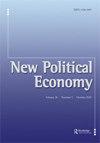The AGM as a site of contestation: evaluating the tactics of environmental shareholder activists
IF 3.8
2区 经济学
Q1 ECONOMICS
引用次数: 0
Abstract
ABSTRACTThe politics of climate change in Australia remains highly fraught, this is despite the country experiencing acute impacts of a changing climate including mega-fires, floods, and severe and prolonged drought. Government inaction has led to limited market signals encouraging producers or consumers to move away from carbon intensive energy production to clean energy. In the absence of regulation, Australian shareholder activists are engaging directly with company boards and executives to reform corporate behaviour. This engagement, environmental, social, and governance (ESG) shareholder activism, has proliferated since 2017, much later than in comparable jurisdictions. Activists have targeted the mining, oil and gas, and finance sectors, due to their contribution to the Australian economy and their direct impact on global emissions. This paper explores the reasons for, and the implications of, the growth in ESG shareholder activism in Australia. It argues that the emergence of this activism in Australia was delayed due to complexities in the country's corporations' law. Regulatory attempts at stymying ESG shareholder activism resulted in the emergence of a duopoly of actors, at the cost of broader investor and civil society engagement. It is concluded that the rise of ESG shareholder activism in Australia is linked to growing tension between societal expectations, regulation, and the behaviour of firms. And, that ESG activists have been successful in leveraging this tension. There is evidence that large corporates have responded to activist claims, rendering this form of activism a potentially effective method for addressing some of the most pressing issues facing society.KEYWORDS: ESG shareholder activismanti-corporate politicssocial movementsclimate changeenvironmental politics AcknowledgementsThe author wishes to thank the two anonymous reviewers and the ECPR General Conference 2023 Energy Politics, Policy and Governance Standing Group panels for their generous engagement with the paper.Disclosure statementNo potential conflict of interest was reported by the author(s).Notes1 This was followed by an attempted hostile takeover of the firm by entrepreneur and philanthropist, Mike Cannon-Brooks. This bid ultimately failed but did lead to the appointment of four new Cannon-Brooks-backed independent board members and put an end to the proposed demerger that would have carved out the emissions intensive business.2 This figure is of course much higher for Australia’s neighbouring Pasifika communities, who are 100 times more likely to be displaced by climate induced crises than those living in Europe. It must be noted that states in the global north (including Australia) have contributed the majority of the emissions that are likely to displace those whose contributions have been minimal.3 While there are some similar actors in other jurisdictions (i.e. People for the Ethical Treatment of Animals), the majority of filers in the UK and US partner with institutional investors in order to gain access to shareholders’ rights. For example, ICCR’s board includes representatives of fund managers and US group As You Sow co-files with institutional investors who hold the requisite number of shares.Additional informationFundingThis work was supported by University of Sydney.Notes on contributorsAinsley ElbraAinsley Elbra is a researcher in the field of international political economy. Her work focuses on business-state relations, private governance, and anti-corporate activism. She has published on the power of multinational corporations including efforts at combating multinational tax avoidance, the political power of professional services firms and the role of mining companies in the Global South. Her research has been recognised by the Australian International Political Economy Network, which awarded her the inaugural Richard Higgott Journal Article Prize in 2015.作为争论场所的年度股东大会:评估环保股东积极分子的策略
尽管澳大利亚正经历着气候变化的严重影响,包括特大火灾、洪水和严重而持久的干旱,但澳大利亚的气候变化政治仍然非常令人担忧。政府的不作为导致鼓励生产者或消费者从碳密集型能源生产转向清洁能源的市场信号有限。在缺乏监管的情况下,澳大利亚股东维权人士正直接与公司董事会和高管接触,以改革公司行为。这种参与,即环境、社会和治理(ESG)股东激进主义,自2017年以来激增,比可比司法管辖区晚得多。由于矿业、石油和天然气以及金融行业对澳大利亚经济的贡献以及它们对全球排放的直接影响,活动人士将目标对准了这些行业。本文探讨了澳大利亚ESG股东行动主义增长的原因和影响。它认为,由于澳大利亚公司法的复杂性,这种激进主义在澳大利亚的出现被推迟了。监管机构试图阻碍ESG股东行动主义,结果出现了双寡头垄断,代价是投资者和民间社会的广泛参与。结论是,澳大利亚ESG股东激进主义的兴起与社会期望、监管和公司行为之间日益紧张的关系有关。ESG积极分子成功地利用了这种紧张关系。有证据表明,大公司已经对激进主义者的主张做出了回应,这使得这种形式的激进主义成为解决社会面临的一些最紧迫问题的潜在有效方法。关键词:ESG股东行动主义、反企业政治、社会运动、气候变化、环境政治作者感谢两位匿名审稿人和ECPR大会2023年能源政治、政策与治理常设小组小组的慷慨参与。披露声明作者未报告潜在的利益冲突。注1紧随其后的是企业家兼慈善家迈克·坎农-布鲁克斯企图恶意收购该公司。这一收购最终以失败告终,但最终任命了四名新的坎农-布鲁克斯支持的独立董事会成员,并终止了拟议中的分拆计划,该计划原本将剥离这家排放密集型企业对于澳大利亚的邻国帕西菲卡社区来说,这个数字当然要高得多,他们因气候引发的危机而流离失所的可能性是欧洲人的100倍。必须指出的是,全球北部的国家(包括澳大利亚)贡献了大部分的排放量,它们很可能取代那些贡献最小的国家虽然在其他司法管辖区也有一些类似的行为者(例如,人道对待动物组织),但英国和美国的大多数申报者与机构投资者合作,以获得股东权利。例如,ICCR的董事会包括基金经理和美国As You Sow集团的代表,他们与持有一定数量股份的机构投资者共同提交文件。本研究得到了悉尼大学的支持。作者简介ainsley Elbra ainsley Elbra是国际政治经济学领域的研究人员。她的研究主要集中在商业国家关系、私人治理和反公司激进主义。她发表过关于跨国公司力量的文章,包括打击跨国公司避税的努力、专业服务公司的政治力量以及矿业公司在全球南方的作用。她的研究得到了澳大利亚国际政治经济网络的认可,该网络于2015年授予她首届理查德·希戈特期刊文章奖。
本文章由计算机程序翻译,如有差异,请以英文原文为准。
求助全文
约1分钟内获得全文
求助全文
来源期刊

New Political Economy
Multiple-
CiteScore
10.10
自引率
9.50%
发文量
41
期刊介绍:
New Political Economy aims to create a forum for work which combines the breadth of vision which characterised the classical political economy of the nineteenth century with the analytical advances of twentieth century social science. It seeks to represent the terrain of political economy scholarship across different disciplines, emphasising original and innovative work which explores new approaches and methodologies, and addresses core debates and issues of historical and contemporary relevance.
 求助内容:
求助内容: 应助结果提醒方式:
应助结果提醒方式:


